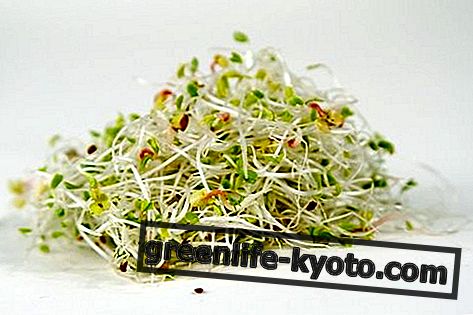
What is indispensable
There are some absolute principles from which one can never derogate. They are the essential basis for avoiding serious risks and giving the body essential supplies. They never allow exceptions.
Fats
To minimize animal fats and palm, coconut and palm kernel fats completely eliminate hot-pressed oils, ie all industrial oils and margarines. Replace them with extra virgin olive oil, supplemented with:
- Two teaspoons of cold-pressed linseed oil, or better a half tablespoon of freshly ground flaxseed;
- A tablespoon of cold-pressed sunflower or soy oil (or a handful of if oily: sunflower seeds, walnuts, hazelnuts, almonds, etc.) .
sugar
Eliminate refined white sugar: replace it with whole sugar and / or honey. Avoid "light" products because they contain sweeteners. However, the sugar must be reduced (even the "good" ones like honey, etc .: max = 3 teaspoons a day) because
- Unbalance the power supply;
- Increases insulin;
- Causes intestinal fermentation.
BEWARE of hidden sugars!
Desserts
Eliminate all industrial pastry. Especially chocolate and substitutes, creamy ice creams, candies. Try to produce cookies and cakes at home (avoid recipes with lots of eggs and lots of fat). Sorbet ice creams are allowed, in moderation to avoid excess sugar.
Do not smoke: NEVER
Radically reduce alcohol
Remove liqueurs and white wine. Do not exceed half a glass of red at the meal (to be eliminated in case of illness). It is a heavy rule for all those who are accustomed to the use of wine (or worse liquors). But it is not avoidable: alcohol damage is extremely serious: for patients with degenerative or autoimmune diseases they make it impossible to control the disease.
A spoonful of raw cereals
It is necessary to consume at least one tablespoon of finely ground raw cereals at the time. They are generally used in Budwig cream. But they can be mixed with soups (letting them cool a little in the dish before adding the flour), fruit juices, vegetable smoothies, yogurt. Cereals must be whole organic. The most suitable are rice, world barley, oats, buckwheat.
The milk
Consume small quantities of dairy products and milk, only sour and not UHT: better organic. This is especially true for those with blood group 0 or A
Coffee and exciting
Check the effects of coffee on your health. Coffee is not negative, on the contrary it can have positive effects; but it has a strong exciting effect, which for someone can be harmful (max two or three a day). Tea, while containing the same amount of caffeine as coffee, is less exciting
However, preferring green tea is a powerful antioxidant; Black tea is a carcinogenic risk factor
Water and carbonated drinks
Drink at least a liter and a half of water a day. Prefer to drink away from meals, but moderate use is also fine at mealtimes. It is better to use non-carbonated water. It is important to drink a large glass of water as soon as you get up. In general, normal drinking water is very good in Italy.
Carbonated soft drinks are too rich in sugars or artificial sweeteners: they must be completely eliminated. They are usefully substitutable with fruit juices (unsweetened) diluted with water.
Do not consume white flours
Whole grains bring zinc and manganese, essential elements for the balance of the nervous system, which are normally destroyed by sieving. From the refined cereal, 'death' flours are produced, very conservable, not even coveted by parasites, which can produce greater blood viscosity with slowing down and circulatory disorders.
Choose wholemeal bread with a sure biological origin and natural leavening. As far as possible avoid white bread, industrial biscuits. However, the use of bread must be reduced: try not to eat bread and pasta at the same meal.
Flakes and pasta
They are elements with decreased nutritional value, unless they are made at the moment: both cereal flakes and popcorn that industrial pasta. The use of pasta should be limited to two or three times a week (a little more for those with group A). An appropriate use of cereals is obtained using the whole boiled grain (excellent, in addition to rice, wheat, spelled, millet, buckwheat, oats).
Packaged foods
Limit canned products:
- Use them only rarely (legumes), bearing in mind, however, that it is better to consume canned vegetables than to consume them little due to lack of time or experience;
- Choose those with boxes lined inside:
- Avoid all pre-cooked industrial foods.
Cooking
Avoid overcooked foods: they can also be eaten raw: courgettes, green beans, Brussels sprouts, broccoli, cauliflower, turnips, spinach, etc.
- Never fry: prefer cooking in foil, sauce, braised meats, stews;
- Prefer steaming.
Food storage
Pay close attention to the oxidation of food in contact with air:
• Do not store them for long;
• Use hermetically sealed containers, not aluminum (not even aluminum foil in direct contact with food ...).
If you are equipped, use vacuum storage. Frozen foods are preferable to preserves, but fresh products are better.
Meats
Reduce meat consumption; favor legumes as a source of protein.
- Choose fish (at least twice a week)
- Choose chicken, turkey, rabbit, horse, if you can't be a vegetarian.
In any case, try to avoid meat from battery farms.
Chew, chew, chew ...
Chew your food thoroughly and for a long time. The ancients said that "the first digestion takes place in the mouth". The more you chew, the faster digestion takes place and intestinal absorption will be facilitated, without harmful fermentation.
Raw
A mainly raw diet
- It makes the indispensable nutritional elements more easily;
- It involves more rapid satiety and weight loss;
- Stop caries formation;
- Prevents 'undermining' of the teeth;
- Reduces / eliminates intestinal gases.
intolerance
In the diet it is good to insert changes and new foods in gradual progression; introduce only one type of new cereal in each meal, verifying the ease of digestion for your body
Weight
Check your weight. Remember that obesity is not only an aesthetic factor, but a disease. If it is important not to be obsessed with current fashions, it is equally important to bear in mind that obesity is always (even if not only) an indication of poor nutrition: unbalanced and / or excessive. The other factor is the possible lack of exercise . If your diet is balanced and you are equally obese, just reduce the quantity of the ingredients proportionately, without altering the overall balance. Watch out for the small "things" taken away from meals: they can compromise the balance of the diet.
The balance between meals
Breakfast like a king, lunch with princes, dinner with the poor.
Balance in meals
Implement a reasonable balance between the main components of the diet. Take at every meal:
- Raw vegetables (but also cooked vegetables);
- Carbohydrates (cereals, cooked vegetables, potatoes, etc.);
- Protein;
- The small amount of fat indicated.













